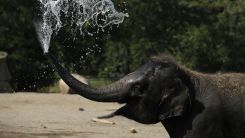Mark B.
Chemical Used as Defense Against Pests, Used by Moths to Lay Eggs

New Air Purifier, AirSoap, Claims to Kill Viruses HEPA Filters Can't

The Social Dilemma: Netflix Explores Social Media Ethics and Effects on Mental Health

Passing Out Drunk Could Double Risks of Dementia
New Study Finds at Least 45 Planets With Qualities Similar to Earth

[Survey] Working Women Hit Worse Than Men in First Months of Pandemic

Uniphi Launches "The Virtual Astronaut" for Charity

Children Whose Parents Are Divorced Have Lower Levels of Love Hormones

Crocodiles Fight Over a Dead Cow in an Outback Billabong

Philippines Studying Coconut Oil as Potential COVID-19 Treatment

Researchers Control Bacteria by Switching Lights On and Off
Catherine Koerner to Become Next NASA Orion Program Manager

4 Relatively "Modern" Technologies That Are Way Older Than You Think

NASA Sentinel 6 Michael Freilich to Launch in November
India Successfully Tests Its Own Scramjet Engine, Eyes Hypersonic Cruise Missiles

Apple Posts Biggest Single-Day Loss In History

400-Year-Old Frozen Goat Offers Insight on Ice Mummies

China's Gaofen 11 Satellite Launch Had Its Rocket Booster Narrowly Missing a School
Belgian Nanosatellite Carries Finland's Remote Sensing Technology To Space
Rocket Lab Receives a Five-Year Launch Operator License from FAA

Crowds Fill California Beaches Over Labor Day Weekend Amid Heatwave and COVID-19

China's Mysterious Reusable Spacecraft Lands After Two-Day Flight

NASA's SLS Rocket Exceeds Cost Estimates, Notifies Congress

Pakistan's Lone Elephant Prepared for Move To Cambodia
New Study Offers Insight on Human Impact on Mammal Extinction

The Canadian Space Agency Meets Its First Female President
Rocket Lab Launches First Satellite Built and Launched from New Zealand

Elon Musk on Mars Colonization: "Good Chance You'll Die"
4 People Who Suddenly Became Geniuses Due to Acquired Savant Syndrome
Most Popular

Can We Bring Back Extinct Animals? How De-Extinction Science and Technology Work

Why Do Stars Explode? Supernova Formation and the Final Stage of a Star Lifecycle

The Air Pollution Climate Link: What Environmental Science Reveals About Our Changing Planet

Extreme Heatwaves Explained: What Extreme Heat Science Reveals About Our Changing Climate




